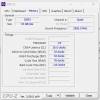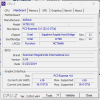10 Dec 24: Final edit: BCLK OC doesn't work outside of the usual ~108MHz norm and appears to impact GPUs.
This board does not support MCC R0 Xeons (e.g. Q071). Essentially, it's good to only run a D0 CPU; it's a better use of time to get a Gigabyte C741 board.
At least those also work with production Xeon 4th/5ths instead of being stuck with SPR-WS and its lackluster lineup and refresh.
Leaving original contents behind for historical purposes.
I don't have the board as of this edit any longer.
-
TLDR: "Watch and/or help me cook a CPU or otherwise get it flying"
A tangent in a similar thread https://forums.servethehome.com/ind...phire-rapids-sp-es-works-it.41306/post-428307 suggests some limited success in using BCLK to overclock these CPUs, but I haven't been able to reliably get over even ~111MHz BCLK on my particular comination of Asrock W790-WS and QYFU.
The background:
Have an ASUS W790-ACE and QYFU 48c ES, D0 stepping.
Recently acquired an Asrock W790-WS as a sidegrade and to move the ACE in place of a Broadwell node. I like the Asrock's layout a bit more:
far faster POST times.
Onto BCLK OC testing:
One thing I noted was in the description of the Asrock board on their website was the "Hyper BCLK engine" feature. For the uninitiated, this was once the marketing term Asrock used for motherboards with external clock generators during the first round of Skylake CPU launches, allowing for overclocking of non -K-SKU desktop CPUs ever since that was locked away with Sandy Bridge.
I can corroborate some other findings, though:
Monitoring software fails to notice the increases in speeds; only benchmark results show that anything has actually changed.
Sole exception is Asrock's own utility.
On the Asus ACE, monitoring software did show the increase in BCLK.
Testing notes:
I set static 1.1V on Vcore and the mesh.
CPU was set to a global 29x core multi, ~3.2GHz when loaded.
Mesh ratio was dropped to 23.
DRAM was dropped to 4000MT/s @ 100MHz BCLK for testing to avoid going much above 4800MT/s during BCLK adjustments.
I fixed stock timings from 4800MT/s in place; otherwise, I noted that the board would tighten timings if left alone at "auto".
Results:
Stock scores were around 48-50K CB23 and low 26K in CPU-Z multithread. New ones attached.
Beginning around 112-113 MHz BCLK, the board started having trouble POSTing.
No reliable POSTs above 114MHz BCLK ever occurred.


So here I sit at 110 MHz BCLK out of ideas. Would love to get feedback or other things/UEFI options/etc. to test.
This board does not support MCC R0 Xeons (e.g. Q071). Essentially, it's good to only run a D0 CPU; it's a better use of time to get a Gigabyte C741 board.
At least those also work with production Xeon 4th/5ths instead of being stuck with SPR-WS and its lackluster lineup and refresh.
Leaving original contents behind for historical purposes.
I don't have the board as of this edit any longer.
-
TLDR: "Watch and/or help me cook a CPU or otherwise get it flying"
A tangent in a similar thread https://forums.servethehome.com/ind...phire-rapids-sp-es-works-it.41306/post-428307 suggests some limited success in using BCLK to overclock these CPUs, but I haven't been able to reliably get over even ~111MHz BCLK on my particular comination of Asrock W790-WS and QYFU.
The background:
Have an ASUS W790-ACE and QYFU 48c ES, D0 stepping.
Recently acquired an Asrock W790-WS as a sidegrade and to move the ACE in place of a Broadwell node. I like the Asrock's layout a bit more:
- the PCI-E slot + M.2-from-CPU layout is more useful to me
- the additional NIC over the ASUS ACE is a bonus for someone not picky
- the built-in WiFi is nice for occasional carrying around of this monstrosity
the WPBT binary (that is, Asus' Armoury Crate, Asrock's Driver Installer) isn't enabled by default every time I clear CMOSMay have been an OEM customization; this was changed after a BIOS update
Onto BCLK OC testing:
One thing I noted was in the description of the Asrock board on their website was the "Hyper BCLK engine" feature. For the uninitiated, this was once the marketing term Asrock used for motherboards with external clock generators during the first round of Skylake CPU launches, allowing for overclocking of non -K-SKU desktop CPUs ever since that was locked away with Sandy Bridge.
I can corroborate some other findings, though:
Monitoring software fails to notice the increases in speeds; only benchmark results show that anything has actually changed.
Sole exception is Asrock's own utility.
On the Asus ACE, monitoring software did show the increase in BCLK.
Testing notes:
I set static 1.1V on Vcore and the mesh.
CPU was set to a global 29x core multi, ~3.2GHz when loaded.
Mesh ratio was dropped to 23.
DRAM was dropped to 4000MT/s @ 100MHz BCLK for testing to avoid going much above 4800MT/s during BCLK adjustments.
I fixed stock timings from 4800MT/s in place; otherwise, I noted that the board would tighten timings if left alone at "auto".
Results:
Stock scores were around 48-50K CB23 and low 26K in CPU-Z multithread. New ones attached.
Beginning around 112-113 MHz BCLK, the board started having trouble POSTing.
No reliable POSTs above 114MHz BCLK ever occurred.


So here I sit at 110 MHz BCLK out of ideas. Would love to get feedback or other things/UEFI options/etc. to test.
Last edited:



